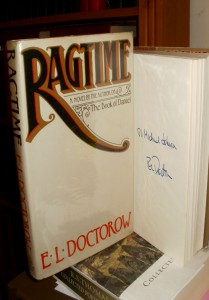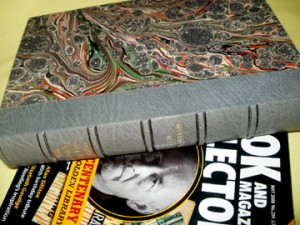Last night I heard on the radio that New York writer E L Doctorow had died aged 87 years. The radio was an appropriate means of conveying the news for he was a writer of long past eras when mass communication was in its infancy.
For me Mr Doctorow was a kind of sociologist of American life where today’s attitudes and diverse outlooks were grounded and shaped by social forces and individuals in bygone times. Educated at Columbia and then has an English teacher in New York his books conveyed a sense of dynamic change and wonder. I came across his work at an auction sale, purchasing a box of American literature with a standout fine first editions copies of Tennessee Williams The Roman Spring of Mrs Stone (with Cecil Beaton dust jacket) and Nathaniel West’s The Day of the Locust. They were big names of the 30s through to the early 50s and West in particular wrote of a sense of disillusion and foreboding about what was to follow the Depression. A nice first of Doctorow’s Ragtime (1976) accompanied the purchase. I gave him a try and straight away I found a writer to take you into the mind of nearly all classes of Americans.
For me the background to the novels of the Jazz Age, Depression, Worlds Fair, the Rosenberg spies and the Civil War – spanning some one hundred years – was to select times of crises and change further enough away to allow the reader to recognize the similarities without prejudice. One found ordinary people like Coalhouse Walker Jr pianist of Scott Joplin tunes outsmarting those who defamed him. The social values of civil society are present, but Doctorow cuts through the narrow versions of patriotism, respectability, and liberty to give them new revitalized meaning by purposeful individuals. Coalhouse was such an interesting character that he was revived as Coalhouse senior, still a music making black man in a white world in his last major novel The March (2006). The book was very well received and it proved a fitting tribute to a great writer.
Ragtime and Billy Bathgate were made into motion pictures, and the former a musical. The influence on popular culture is obvious; but a more subtle one is this stimulus his approach may have had on crime writers looking for a wider historical landscape. We have the recent novels of Dennis Lehane beginning with characters such as Babe Ruth in The Given Day. (2008); then James Lee Burke has been drawn to America’s past in his recent novels such as Wayfaring Stranger (2014) .
Back in the 80s I wrote to Mr Doctorow and expressed my admiration for his work. Would he  care to sign some books for me I asked. He would be delighted. I sent a half dozen to his publisher in New York. Some six months or more they were returned all signed to me. He was for me the American writer of the golden age of dreams where the small individual had dignity and plenty of humanity.
care to sign some books for me I asked. He would be delighted. I sent a half dozen to his publisher in New York. Some six months or more they were returned all signed to me. He was for me the American writer of the golden age of dreams where the small individual had dignity and plenty of humanity.















